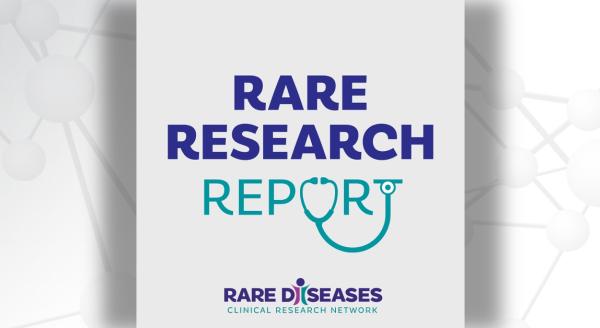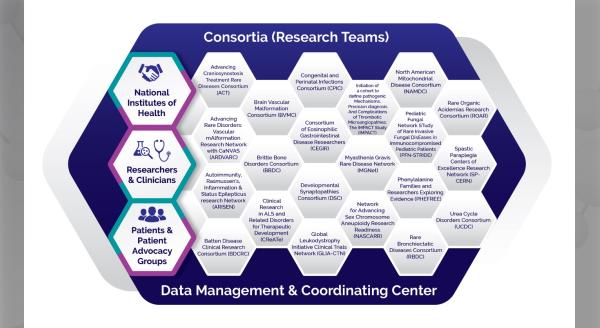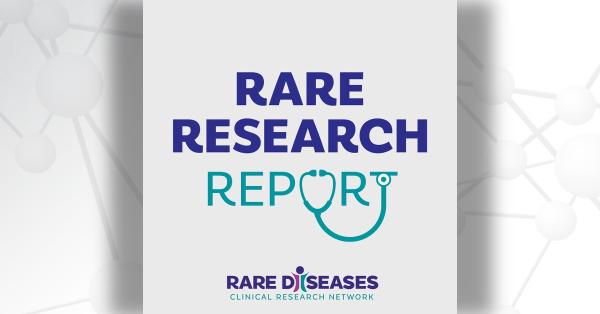Kristin Anthony is president and founder of the PTEN Hamartoma Tumor Syndrome Foundation, a patient advocacy group of the Developmental Synaptopathies Consortium (DSC) that aims to find treatments or a cure for PTEN hamartoma tumor syndrome (PHTS). PHTS is a spectrum of disorders characterized by the widespread presence of multiple hamartomas (localized, benign, tumor-like malformations) that may increase the risk for certain cancers and neurodevelopmental disorders. She is also the new chair of the Rare Diseases Clinical Research Network (RDCRN)’s Coalition of Patient Advocacy Groups (CPAG). Here, she shares her start in rare disease advocacy, exciting work with the PTEN Foundation and DSC, and goals as the CPAG chair.
How did you get involved in advocacy work for rare diseases?
I started in the rare disease advocacy world when our family was affected by PHTS. I learned that there was little to no support provided for PHTS patients and decided to change that for our community.
Can you tell us more about the PTEN Foundation?
The PTEN Hamartoma Tumor Syndrome Foundation was founded to find treatments or therapies for PTEN syndromes. Our team is developing research tools to complement existing research programs, including our IRB-approved patient registry and biorepository. We fund research, provide PHTS education, and support patients. PHTS includes Cowden syndrome (CS), Bannayan-Riley-Ruvalcaba syndrome (BRRS), PTEN-related Proteus syndrome (PS), and Proteus-like syndrome.
We have a fantastic team. Our top successes include our Center of Excellence program, our patient registry, and our biorepository, as well as our effort to support clinicians who are working to improve international care guidelines. Each of these initiatives aims to accelerate research and improve patient care.
What is the latest progress on treating the diseases studied by the DSC?
We have three fantastic advocacy organizations represented in the DSC: the PTEN Hamartoma Tumor Syndrome Foundation, Tuberous Sclerosis Alliance, and Phelan-McDermid Syndrome Foundation. Progress has been made by all disease groups supported under the DSC. For example:
PTEN hamartoma tumor syndrome (PHTS)
- The DSC Scholarly Awards Committee selected Andrew Dhawan, MD, DPhil, a resident physician in the Department of Neurology at Cleveland Clinic, for the PHTS Fellowship Award (which will begin in September 2022). Dr. Dhawan’s project, entitled “Defining Neurological Phenotypes to Establish Clinical Guidelines in PHTS,” seeks to build upon a natural history registry of patients with PHTS by adding careful clinical annotation of neurological and neurodevelopmental findings. This data will help accelerate the creation of clinical consensus guidelines based on experience and evidence for the best practices in caring for patients with PHTS. The fellowship includes co-mentorship between Dr. Charis Eng (DSC lead principal investigator for PHTS) and Dr. Jacob Scott’s (mathematician) laboratories at Cleveland Clinic.
- The DSC PHTS Team was awarded a diversity supplement to increase research participation for non-English speakers.
- The DSC PHTS Team recently published findings in the journal Human Molecular Genetics: “A randomized controlled trial of everolimus for neurocognitive symptoms in PTEN hamartoma tumor syndrome.”
Phelan-McDermid syndrome (PMS)
- The Phelan-McDermid Syndrome Foundation offered a Young Investigator Award with a neuropsychiatric illness focus that started July 1. This is one year of funding with the opportunity for re-application.
- PMS Clinical Consensus Guidelines are nearing publication, which cover 12 symptom areas in PMS.
- The grant for the PMS Natural History Study was extended another year to Year 6 and was awarded a diversity supplement to increase diversity in clinical visits.
- Two recent publications in PMS from the DSC include:
- “Parent-reported measure of repetitive behavior in Phelan-McDermid syndrome,” Journal of Neurodevelopmental Disorders
- “Strong evidence for genotype–phenotype correlations in Phelan-McDermid syndrome: results from the developmental synaptopathies consortium,” Human Molecular Genetics
Tuberous sclerosis complex (TSC)
- The TSC researchers in the DSC and their collaborators recently published a couple of excellent papers about the characteristics of autism and TAND (TSC-associated neuropsychiatric disorders):
- “Profile of Autism Spectrum Disorder in Tuberous Sclerosis Complex: Results from a Longitudinal, Prospective, Multisite Study,” Annals of Neurology
- “Multivariate data analysis identifies natural clusters of Tuberous Sclerosis Complex Associated Neuropsychiatric Disorders (TAND),” Orphanet Journal of Rare Diseases
- Additionally, the TSC Alliance and TSC community have realized incredible progress, including:
- Approval of topical sirolimus (HYFTOR by Nobelpharma) for treatment of facial angiofibroma in TSC
- A Phase 3 study by Marinus of ganaxolone for epilepsy in children and adults with TSC: “Adjunctive GNX Treatment Compared With Placebo in Children and Adults With TSC-related Epilepsy”
- A Phase 2 study by Noema of basimglurant for epilepsy in children and adults with TSC: “Basimglurant in Children and Adolescents With TSC”
What roles do your patients and advocacy groups play in research?
DSC advocacy groups all play active roles in research, including recruiting for research trials and providing meaningful data for research. All play pivotal roles in the development of academically agreed-upon care guidelines for our diseases.
Can you tell us about your role as incoming chair of the RDCRN’s Coalition of Patient Advocacy Groups (CPAG)?
I had the honor of serving as co-chair for the CPAG under Kristen Wheeden of the United Porphyrias Association and will now serve as the CPAG chairperson. Following her incredible leadership example, I see the CPAG chair role as vital in ensuring that all PAGs under the RDRCN are heard and informed about all RDCRN activities. Additionally, I believe engagement and collaboration with PAGs are key to successful research.
What are your goals for the CPAG?
My goal is to connect with each PAG under the RDCRN to understand what their role is, what they see as valuable about their RDCRN participation, and to understand what they see as needing improvement. I hope to bridge any gaps that are identified.
What do you see ahead for your journey in rare disease advocacy?
My vision for my rare disease advocacy journey is to see collaboration that leads to treatment solutions for the PTEN community and opens the door for successes for our rare disease counterparts.
The Rare Diseases Clinical Research Network's (RDCRN's) Coalition of Patient Advocacy Groups (CPAG) promotes collaboration between patient advocacy groups and the research network to facilitate better access to, and earlier benefit from, research on rare diseases. As the patient advocacy arm of the RDCRN, the CPAG and its members use their position to advance the cause of rare diseases research and improve patient outcomes.
The Developmental Synaptopathies Consortium (DSC) is part of the RDCRN, which is funded by the National Institutes of Health (NIH) and led by the National Center for Advancing Translational Sciences (NCATS) through its Division of Rare Diseases Research Innovation (DRDRI). DSC is funded under grant number U54NS092090 as a collaboration between NCATS, the National Institute of Neurological Disorders and Stroke (NINDS), the Eunice Kennedy Shriver National Institute of Child Health and Human Development (NICHD), and the National Institute of Mental Health (NIMH).






